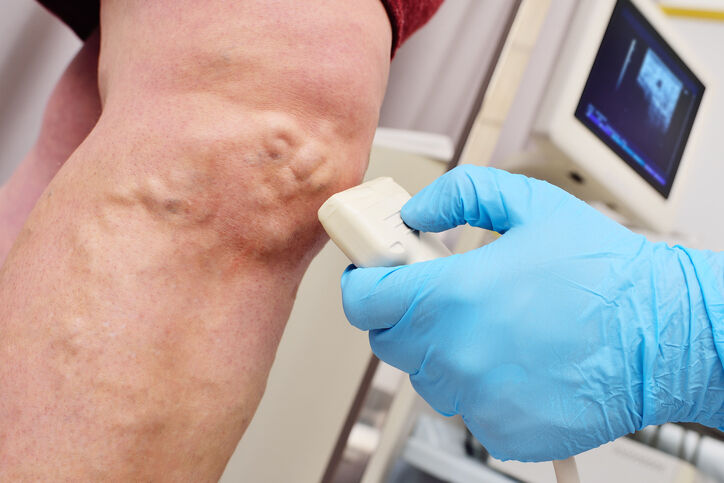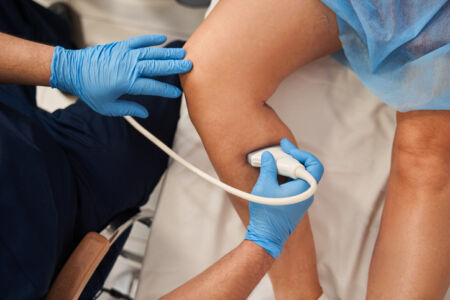
Why You Need an Ultrasound Before Undergoing Venous Insufficiency Treatment
Venous insufficiency is treatable, but your doctor will likely order an ultrasound first. Here’s what you can expect.

Ultrasound imaging creates detailed images of your veins to give your doctor important insight into your vascular health. Learn how this non-invasive imaging technique has improved treatment for venous insufficiency.
Before performing any medical procedure, your doctor will perform a series of tests to determine the exact cause of your condition and how best to treat it. Aside from a physical exam, your doctor may order imaging tests, such as an X-ray, CAT scan, or ultrasound.
Ultrasound was invented in 1794, and by the 1950s, the technology was perfected and became widespread among healthcare professionals. It allows doctors to see the organs, tissues, and other structures inside the body without surgery. In vascular medicine, ultrasound has dramatically improved treatment for venous insufficiency. This term refers to a breakdown of blood circulation in your veins.
Although a physical exam can tell your doctor much about what’s going on in your veins, an ultrasound provides the most accurate picture. An ultrasound includes two components: a small transducer about the size of a hand-held microphone and a computer. When the transducer passes over your veins, it emits high-frequency sound waves that bounce off the soft tissues and blood vessels, producing images on the computer screen.
With those images, your vein specialist can see how blood flows through your veins. Not only does an ultrasound highlight a problem in the vein, but it can also inform your treatment options. The ultrasound picture can also show whether there is a blood clot forming.
An ultrasound is a non-invasive imaging technique that requires no radiation or needles. No special preparation is needed beforehand, and there are no restrictions afterward. Ultrasound has become the go-to standard for venous insufficiency diagnosis and treatment, offering these benefits to you and your doctor:
Gives an accurate diagnosis. You have many veins in your leg. But a physical exam alone won’t pinpoint the problematic one. By providing a detailed picture of how blood flows in your veins, an ultrasound can show your doctor which veins are impacted by venous insufficiency.
Guides treatment. Ultrasound isn’t used only for diagnosis. It’s also used during treatment, such as sclerotherapy and laser ablation. The doctor uses ultrasound images to guide the needle or catheter inside the affected vein. Targeting the exact location of the diseased vein means reducing the risk of treating the wrong vein and any complications.
Shows treatment progress. An ultrasound image allows the doctor to monitor the effectiveness of the treatment in real time. If, for example, the treatment fails to seal the affected vein, the doctor can adjust the dosage or use another technique to destroy the vein and free up blood flow.
Provides a more comfortable experience for the patient. Thanks to ultrasound images, today’s varicose vein treatments are minimally invasive and virtually painless. In many cases, you’ll only need local anesthesia.
The pain, swelling, and cramping of venous insufficiency can negatively affect your quality of life. But if left untreated, venous insufficiency and varicose veins can lead to serious complications, such as venous ulcers and blood clots. But thanks to ultrasound imaging, today’s treatments for venous insufficiency are quick, safe, and successful.
Center for Vein Restoration (CVR) operates three offices in the Atlanta area, each led by a board-certified vein specialist who uses ultrasound to diagnose and treat vein disorders.
Keith S. Moore, MD, is a board-certified general surgeon specializing in vein procedures.
Louis Prevosti, MD, FACS, is a board-certified physician in thoracic and cardiovascular surgery.
James Fonger, MD, FRCS, is a board-certified physician in general and cardiovascular surgery.
Learn more about what we can do for you by contacting our offices today to schedule an appointment or to speak with a representative.
Don't live near an Atlanta CVR vein clinic location? No problem! With over 100 vein clinic locations in 22 states and the District of Columbia, there's sure to be a CVR vein center near you.
Camp Creek Medical Center
3886 Princeton Lakes Way
Suite 140
Atlanta, GA 30331
Northside Center Pointe
1100 Johnson Ferry Road NE
Suite 165
Atlanta, GA 30342
Gwinnett Professional Center
601 Professional Drive
Suite 170
Lawrenceville, GA 30046